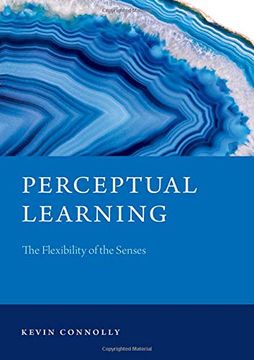Share
Perceptual Learning: The Flexibility of the Senses (Philosophy of Mind Series)
Kevin Connolly (Author)
·
Oup Usa
· Hardcover
Perceptual Learning: The Flexibility of the Senses (Philosophy of Mind Series) - Kevin Connolly
Choose the list to add your product or create one New List
✓ Product added successfully to the Wishlist.
Go to My Wishlists
Origin: U.S.A.
(Import costs included in the price)
It will be shipped from our warehouse between
Wednesday, May 29 and
Friday, June 14.
You will receive it anywhere in United Kingdom between 1 and 3 business days after shipment.
Synopsis "Perceptual Learning: The Flexibility of the Senses (Philosophy of Mind Series)"
Experts from wine tasters to radiologists to bird watchers have all undergone perceptual learning-long-term changes in perception that result from practice or experience. Philosophers have been discussing such cases for centuries, from the 14th-century Indian philosopher Vedanta Desika to the 18th-century Scottish philosopher Thomas Reid, and into contemporary times. This book uses recent evidence from psychology and neuroscience to show that perceptual learning is genuinely perceptual, rather than post-perceptual. It also offers a taxonomy for classifying cases in the philosophical literature. In some cases, perceptual learning involves changes in how one attends; in other cases, it involves a learned ability to differentiate two properties, or to perceive two properties as unified. Connolly uses this taxonomy to rethink several domains of perception in terms of perceptual learning, including multisensory perception, color perception, and speech perception. As a whole, the book offers a theory of the function of perceptual learning. Perceptual learning embeds into our quick perceptual systems what would be a slower task were it to be done in a controlled, cognitive manner. A novice wine taster drinking a Cabernet Sauvignon might have to think about its features first and then infer the type of wine, while an expert can identify it immediately. This learned ability to immediately identify the wine enables the expert to think about other things like the vineyard or the vintage of the wine. More generally, perceptual learning serves to free up cognitive resources for other tasks. This book offers a comprehensive empirically-informed account, and explores the nature, scope, and theoretical implications of perceptual learning.
- 0% (0)
- 0% (0)
- 0% (0)
- 0% (0)
- 0% (0)
All books in our catalog are Original.
The book is written in English.
The binding of this edition is Hardcover.
✓ Producto agregado correctamente al carro, Ir a Pagar.

